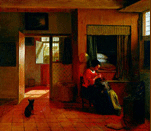3.
Engendering the “Four Nations”
in the Seventeenth Century:
(Re)locating Women in England,
Ireland, Scotland and Wales
Organizers:
- Kate Chedgzoy, English, University of Newcastle-upon-Tyne
- Suzanne Trill, Languages, Literatures and Cultures, University of Edinburgh.
Description:
This workshop will focus upon nine women writers, chosen to represent diverse
social, geographical, political, cultural and religious backgrounds, in order
to explore how these factors intersect with their sense of ‘nationality’.
To facilitate discussion, we have divided these writers into
three thematically focused groups:
- women directly engaging with inter- and/or intra-national politics from
locations in Wales, Ireland and Scotland (Ann Wen Brynkir, Caitlín
Dubh, and Lady Anne Hamilton);
- women’s life writings which trace experiences of mobility and
estrangement within and between the four nations (Alice Thornton, Magdalen
Lloyd and Anne Halkett);
- poetic texts which offer an allegorical or metaphorical engagement with
journeying and belonging (Catherin Owen, Elizabeth Melville, Màiri
Nighean Alasdair Ruaidh).
Each group of writers has been selected to promote analysis
of how different kinds of (re)location might complicate current critical assumptions
about ‘national’ identity and its relationship to gender.
Questions to be addressed in the workshop will include: To what
extent is it possible to identify a specifically gendered discourse in the
way in which these women articulate a sense of their position within a given
geo-political space? What difference does a woman’s social status make
to the processes by which she establishes relationships in a new environment,
and how might this cut across identities founded upon ‘place’
or ‘nation’? What part do linguistic factors such as language,
dialect or register play in the construction of ‘national’ early
modern female subjectivities? How might both generic factors and the mode
of a text’s production and circulation affect either a woman’s
understanding of her own national identity or others’ interpretations
of it (for example, what difference does it make that Eizabeth Melville’s
‘Ane Godlie Dreame,’ first published in Scots, was subsequently
published in English)?
As convenors, we came to raise such questions partly as a result of our own
personal histories of (re)location within the UK (Kate being Welsh by birth,
speech and education but now living in England, Suzanne being English by parentage
but working in Northern Ireland and now Scotland). More broadly, such questions
are of peculiar relevance to the UK at the present time, with the current
trend towards varying forms of devolution and the upcoming four-hundredth
anniversary of the Union of the Crowns of Scotland and England.
The workshop will be organised as follows: the convenors will
provide a brief introduction to key personal, historical, and theoretical/critical
questions in relation to this topic (15-20 mins); participants will then be
divided into three groups to focus on one of the collections of texts (identified
above, 30 mins); and finally, a full plenary discussion at the end will enable
participants to share thoughts, issues and questions raised within their groups
and to consider how these might reflect upon the other texts and current critical
paradigms (40 mins).
Readings:
As few of these texts are readily accessible, the set reading will consist
of transcriptions and, where necessary, translations of key texts provided
by the workshop organizers, made electronically available ahead of the workshop
in order to enable potential participants to familiarise themselves with this
relatively unknown material.
- before 1602: Catherin Owen of Anglesey, “At Siôn Llwyd:
cynghorion y fam i’w hetifedd”/ “To Siôn Llwyd:
the mother’s advice to her heir.” A Welsh woman using an indigenous
poetic form to take on an authoritative and informed role in advising
her son on dealing with an elite English institution (Oxford University).
100 lines (including translation).
- 1603 and 1606: extract from Elizabeth Melville, Ane Godlie Dreame
(1603) and A Godly Dream (1606). 360 lines.
- 1604: letter from Ann Wen Brynkir of Caernarvonshire to her brother,
Sir William Maurice MP, commenting on the politics of the Union of the
Crowns and illustrating the life of her North Wales community. 1 page.
- 1624: Caitlín Dubh, “Do chuala tasc do chráigh fir
Éireann”/ “Elegy for Donnchadh, Earl of Thomond.”
A complex negotiation with the O’Brien, Irish and European elements
of the Earl’s (and the poet’s) cultural location, and between
those and the question of English politics in Ireland. 200 lines (including
translation).
- after 1666: Màiri Nighean Alasdair Ruaidh, “Crònan
an Taibh”/ “The Ocean-Croon.” Exiled by her clan chief,
she celebrates the culture and place she is separated from in traditional
terms, inflected by ongoing political upheaval and cultural change. 160
lines (including translation).
- after 1668: Alice Thornton’s history of the Irish conflict and
narrative of her family’s flight from it in 1641. c. 4 pages.
- 1670s: letters of Magdalen Lloyd, a Welsh servant in London, to her
family in North Wales, negotiating the experience of migration and ideas
about home and belonging. c. 3 pp.
- 1670s-90s: extracts from Lady Anne Halkett’s “Occationall
Meditations” in which she engages with the complexity of Anglo-Scottish
political and religious relations, and her own position within them (born
in England, Halkett was of Scottish descent and lived much of her life
in Fife,Scotland but retained an acute sense of her ‘English’
identity). c. 4 pp.
- 1704: letters of Lady Anne Hamilton from Scotland to her son, Charles,
Earl of Selkirk, who was living in London. The letters concern local political
affairs in Scotland and the possibility of the Union of the Parliaments.
c. 3 pp.
Suggested readings:
- Brendan Bradshaw and Peter Roberts, eds, British Consciousness and
Identity: The Making of Britain, 1533-1707 (Cambridge, 1998)
- Elizabeth Ewan and Maureen M. Meikle, eds, Women in Scotland c.
1100-c.1750 (East Linton: Tuckwell, 1999)
- Douglas Gifford and Dorothy McMillan, eds, A History of Scottish
Women’s Writing (Edinburgh: Edinburgh University Press, 1997)
- Margaret MacCurtain and Mary O’Dowd, eds, Women in Early
Modern Ireland (Edinburgh: Edinburgh University Press, 1991)
- Michael Roberts and Simone Clarke, eds, Women and Gender in Early
Modern Wales (Cardiff: University of Wales Press, 2000)
- Raphael Samuel, “Four Nations History,” History Workshop
Journal 40, Autumn 1995
- Jane Stevenson and Peter Davidson, eds, with contributions from Meg
Bateman, Kate Chedgzoy, and Julie Sanders, Early Modern Women Poets
1520-1700: An Anthology (Oxford: Oxford University Press, 2001)
- Angela Bourke, Siobhan Kilfeather, Maria Luddy, Margaret Mac Curtain,
Gerardine Meaney, Mairin Ni Dhonnchadha, Mary O'Dowd, and Clair Wills,
eds, The Field Day Anthology of Irish Writing, Volumes IV and V,
Irish Women's Writing and Traditions (Cork: Cork University Press
in association with Field Day, 2002).





















